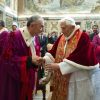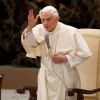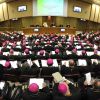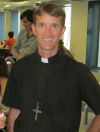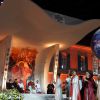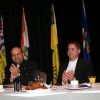Stop the progress insanity
In a recent blog for Cardus — the think tank that among its many other good works publishes Convivium magazine — I cited an item sent to me by a regular correspondent. It was, I wrote, a brilliant, step-by-step summary of the way in which so-called “social progress” has occurred during the past 30 years at the expense of long-standing Canadian tradition, custom and especially faith.
The summary read as follows:
o Find an extreme position calling for radical change and self-define it as moderate.
o Get your fellow travellers on The Long March through the unionized newsrooms of the nation to adopt your language.
o Define all who oppose you as intolerant extremists.
o See above re: fellow travellers, and repeat at teachers’ conventions nationwide. Concerned about their social status, teachers will adopt whatever position is portrayed as most fashionable.
o Bake in oven for two terms of government, use quasi-judicial bodies to institute pogroms against your opponents and, bingo, you have progressive social change no matter how much it might feel like a boot stomping on your face.
The only serious addition I offered was expanding item four to include professional associations: lawyers, doctors, Indian chiefs.
It turned out there’s more, and it came from an academic friend:
o Argue for a supposedly moderate change that goes just beyond generally accepted conventions and principles.
o When some people raise objections, accuse them of engaging in specious slippery-slope arguments, insisting that, of course, we certainly do not mean to advocate for those alleged consequences, and it is offensive to be so misrepresented.
o All the while secretly intend the normalization of precisely those furthermost implications down the road
o Once the change argued for is effected, argue for the next supposedly moderate, incremental change that will bring us closer to the realization of the desired (but temporarily too controversial) more radical outcomes. This involves reminding society of how its enlightened embrace of the previous change should lead them to consent to the next step, and mock those who object by pointing out that the sky hasn’t fallen.
These precepts explain the “how” of surreptitious social “progress” that has led to such travesties as the de facto abolition of the constitutional rights of parents to have schools that teach their children what it means to be Catholic, and Quebec’s pending abolition of our foundational Christian understanding of what it means to be human.
Having defined the “how,” however, neither set offered a proposal for what is to be done. Still, simply identifying the steps of the process creates the expectation that someone, somewhere, has some explaining to do. And that opens the door to challenging the dangerous presuppositions at the heart of the radical upending of our society.
Those presuppositions are:
o Any self-proclaimed “progressive” measure is always an essential step demanded by the “forward movement” of history, and its achievement is inevitable.
o The onus is always on those who are hesitant to adopt such “progressive” measures to show why they should not be adopted.
The deficiencies of both become obvious. The second one is grossly unjust and requires the logical fraud of having to prove a negative. The first contains a childish tautology: we want to do this because it’s progress, and it’s progress because we want to do it.
What this means is that the following demands should be made of anyone who proposes any self-defined “progressive” vision:
o State definitively what the historic end point of your progressive vision will be.
o State truthfully your confidence in your ability to forecast that particular historic end point.
o State plainly what existing natural rights and protections must be sacrificed for your progressive vision to be achieved.
o State concretely how your vision of progress differs from a reversion to barbarism.
Such demands are not obstructionist or reactionary. They are the simple precautions any sane people will take before agreeing to changes in the makeup of their society. The final question, of course, is whether it’s already too late for sanity.
(Stockland is the Director of the Cardus Centre for Cultural Renewal in Montreal.)
Lack of faith can hurt marriage, may affect validity, Pope says
VATICAN CITY - A lack of faith in God can damage marriage, even to the point of affecting its validity, Pope Benedict XVI said.
Year of Faith cinema
In Porta Fidei (The Door of Faith), an apostolic letter announcing the Year of Faith, Pope Benedict XVI urges us to study the history of Catholicism, which he describes as “marked by the unfathomable mystery of the interweaving of holiness and sin.”
Christmas trees remind believers of light of Christ, Pope says
VATICAN CITY - The light of Christ has not dimmed over the past 2,000 years, but Christians today have an obligation to resist attempts to extinguish it
Advent is time to renew faith, bring God's love to others, pope says
VATICAN CITY - Advent's liturgical preparation for Christmas calls Christians to renew their faith in the reality of God's great love and to make a commitment to bringing his love to the world today, Pope Benedict XVI said.
Your faith can guide you in estate planning
What is the difference between a Catholic estate plan and a purely secular estate plan? The answer is simple: a Catholic estate plan is one that takes our Catholic faith into account when making decisions surrounding end-of-life issues.
Here are just a few examples of how our faith can come into effect:
o Living Wills — Power of Attorney (POA) for Personal Care: this allows us to appoint someone to make decisions for us with respect to life support, artificial feeding and other medical measures in the unfortunate event that we become incapacitated. When creating a POA for personal care we should do our best to ensure it adheres to Church teaching on end-of-life issues. Do your research before you see your lawyer so you can instruct him/ her properly as to what you are trying to achieve. If you have any questions, you can consult your priest, the Catechism of the Catholic Church and the Canadian Catholic Bioethics Institute (CCBI). CCBI is affiliated with the University of St. Michael’s College and seeks to promote and protect the dignity of the human person through ethics research and education in health care and the life sciences. The institute is a wonderful resource you can use to explore the Catholic Church’s position on everything from organ donation, assisted suicide and other end-of-life issues (www.ccbi-utoronto.ca).
o Having a Funeral Mass: The sad truth is that there are many children who are no longer practising the faith. Many practising Catholics assume that when they pass away that non-practising family and friends will know to have a funeral Mass celebrated for them. Unfortunately this is not always the case. The best way to ensure that you have a funeral Mass is to make your wishes known.
o Masses in your Will: Many people don’t know this, but you can put it into your Will to have a Mass said for the repose of your soul. The Development Office of the Archdiocese of Toronto has the wording you can share with your lawyer.
o Using Catholic Advisors: Lawyers, accountants and financial advisors are kneeling in the pews beside us every Sunday and we just don’t know it. As Catholics, we are used to saying, “Peace be with you” and then leaving our parish as soon as Mass is over. The archdiocese of Toronto has spent the last five years building a list of advisors that you can access. If you would like assistance in finding a lawyer to help you with your Will and POA preparation, contact the Development Office.
o Estate Planning Checklists: Have you ever wished that you could find a simple tool to guide you through everything you need to do in your Will preparation and estate trustee selection? The archdiocese of Toronto has Will planning and estate trustees’ checklists that you can use. And best of all they were written with our Catholic faith in mind. Catholic action items include: suggesting that you put in your Will a request of the guardian of your children that they receive all of their sacraments as well as prompting your estate trustee to contact your parish when you pass away to request that they update the parish records. If you would like the checklists, contact the Development Office.
o Burial Preparations: In the early days of the Church we used to bury our dead in catacombs. As time went on, we began burying our dead beside our parishes — as is the case with the quaint country parishes we drive by in rural areas with small cemeteries beside them. As cities grew, parish burial was no longer feasible due to space constraints. We began to have centralized locations that serviced multiple parishes — as is the case today with Catholic Cemeteries. A Catholic cemetery is much more than just a geographical location. It is consecrated ground and in a very real sense, a part of our parish. It has been set aside for God. Have you pre-planned your funeral arrangements with Catholic Cemeteries? If not, consider contacting them. They can answer any questions you may have, including ones surrounding cremation.
o Where do we recognize Christ: An elderly woman once shared that when she was a little girl during the Great Depression her father lost his job just before Christmas. When Christmas day came, there was no dinner and no presents. This must have been very hard on her father. A knock came at the door and when her father answered it, there was a man with Christmas dinner and a shoebox gift for all the children. When she opened her shoebox she found a pair of red mitts inside. It was especially cold that winter and her exact words were that she thought they were a gift from heaven. She swore to herself that when the day came that she was able to give back to someone else, she would. It was at that moment that she recognized Christ.
All of us can ask ourselves where in our lives we have recognized Christ. It is a very personal question and one that is best left to prayer. Your Will could be your opportunity to make that gift you always wanted to, but never thought you could.
Perhaps you have been at your parish for over 30 years and want to remember your parish in your Will. Or perhaps there was a special priest who visited you or a loved one while sick and you want to honour that act of kindness with a gift to the seminary or The Shepherds’ Trust. You may want to help support people in need with a gift to ShareLife.
There is no right or wrong answer. Pray about where the Lord has touched you in your life and direct your gift there.
Ask God. He will never steer you wrong.
The Development Office of the Archdiocese of Toronto has a free Catholic estate planning kit as a service to parishioners. To receive yours call (416) 934-3411 or e-mail development@archtoronto.org.
Pope says faith and hope are foundation of migrants' journeys
VATICAN CITY - Migrants usually are forced to leave their countries because of poverty, hunger or violence, but faith and hope help them face their hardships and seek a better life elsewhere, Pope Benedict XVI said.
The pope chose "Migrations: pilgrimage of faith and hope" as the theme for the 2013 celebration of the World Day of Migrants and Refugees, and issued a message that touched on many facets of what he called a "striking phenomenon" that raises "dramatic challenges."
The Vatican released the message Oct. 29, on the heels of the three weeklong Synod of Bishops on the new evangelization, which brought together church leaders from around the world to discuss efforts to strengthen the faith of Catholics and bring lapsed Catholics back.
"Faith and hope are inseparable in the hearts of many migrants, who deeply desire a better life and not infrequently try to leave behind the 'hopelessness' of an unpromising future," Pope Benedict wrote.
The pope's message was introduced in a news conference at the Vatican by Cardinal Antonio Maria Veglio and Bishop Joseph Kalathiparambil, respectively, president and secretary of the Pontifical Council for Migrants and Travelers.
Migration by its nature involves suffering the pain of uprooting and separation from family, country and possessions, the pope said, but faith and hope allow those who emigrate to face a difficult present if they can believe it will lead to a better future.
They are not just seeking to improve their financial, social or political condition, the pope said. People who leave their native countries are hoping to "encounter acceptance, solidarity and help" from those in their new country who can recognize the values and resources they have to offer, he said.
The Catholic Church, he said, is a witness to the "immense poverty and suffering entailed in migration" that often leads to "painful and tragic situations." The church is on the ground with its various agencies to assist migrants, refugees and asylum seekers in emergencies and in beginning their new lives.
Church agencies, he said, should not forget the religious dimension of the migrants' lives and "must devote special attention and care" to their spiritual needs.
Ecumenical dialogue is important for assisting other Christians, he said, and even with Catholic immigrants, it may mean accommodating the faithful of various rites.
Migrants and refugees who are guests have the right to expect solidarity, but they also have the responsibility to abide by the rules of the host country, he said.
The pope also spoke about the plague of human trafficking, and said that better immigration policies in the wealthier countries could help in combating the various forms of exploitation that illegal immigrants often face. Those policies, he said, should not, however, lead to "a hermetic sealing of borders" or simply adopting measures that discourage immigrants.
Cardinal Veglio emphasized the need to treat migrants and refugees with warmth and respect, and he said their integration must be accompanied by proper regulations, both international and domestic.
Bishop Kalathiparambil spoke of the extreme difficulties faced by refugees and those asking for political asylum, who often leave their countries "because of innumerable violations of their human rights and because of the cruelty of bloody conflicts."
He illustrated how refugees often are forced to put their lives in the hands of traffickers, who, once they have taken great sums money to bring them across the sea or to other destinations, continue to exploit them as forced laborers or sex workers.
Refugees must have the opportunity to become part of the new society to which they have escaped, where they have "great potential to bear witness and evangelize," the bishop said.
In most parts of the world, the Catholic Church celebrates the World Day of Migrants and Refugees Jan. 13, while the United Nations marks it on Dec. 18. In the United States, the U.S. Conference of Catholic Bishops marks National Migration Week Jan. 6-12.
Reigniting faith
Initially, it seemed odd when Pope Benedict XVI declared the Church would celebrate a special Year of Faith. Aren't followers called to be joyful witnesses to Christ every year? For the baptized, isn't faith already the fabric of daily Christian life?
The answers to those questions, of course, are yes. At least they should be. So in that sense the Year of Faith, which launched on Oct. 11, is preaching to the converted. But none of that diminishes the foresight of the declaration or the duty to heed its call.
The coming year is designed to usher the Church into a period of reflection and rediscovery of faith and, by extension, into a revival of Christian values. The Pope has long worried that faith, particularly in the West, is being battered by cultural and political forces that are causing a "profound crisis of faith" in society. His Year of Faith is the Church fighting back.
He wants to entice lapsed Catholics back to church and to introduce the faith to non-believers. To achieve those goals the Pope intends to stoke the fires of evangelization in all Catholics by en- couraging a deeper understanding of Scripture and Church teachings, and then urging all Catholics to proceed with authority and joy to give public witness to faith.
"We want this year to arouse in every believer the aspiration to profess the faith in fullness and with renewed conviction, with confidence and hope," the Pope said.
He calls the Year of Faith a time to study, profess and demonstrate faith. It is a year for Catholics to re-learn their faith and connect proactively with others whose devotion has lapsed or by example to others who have never found God.
There are many ways to accomplish this — through the sacraments and prayer, meditation and study, retreats and pilgrimages — but some practical activities are particularly recommended. These begin with studying the Catechism of the Catholic Church, which just turned 20. It is the training manual for Catholics and the first source to learn or re-learn the faith.
Catholics are also encouraged to read the documents of Vatican II, to memorize the Nicene Creed and recite it daily, to attend adoration of the Blessed Sacrament, to study the lives of saints and to participate in parish workshops that explore Scripture and Church teaching. Pilgrimage is also important, not necessarily to distant locales like the Holy Land, but to closer sites such as the Martyrs' Shrine in Midland, Ont., or St. Joseph Oratory in Montreal, or St. Michael's Cathedral in Toronto.
The Year of Faith is focussed on the laity, "who should not be considered collaborators of the clergy, but people who are co-responsible for the Church," said Benedict. It is about them becoming proud Catholics and Catholics that others can be proud of.
University tests students’ faith
Ottawa - There are no windows in the Catholic chaplaincy office at Carleton University. The small and simple room holds a desk, a couch, one or two holy garments and an array of other materials used to rouse student interest in the word of God. The chaplaincy is underground in one of the concrete tunnels that connect the buildings on campus.
“I think the university chaplaincy was neglected for many years,” said Fr. Tim McCauley, Carleton’s chaplain.
In its early years, the chaplaincy lacked the funding and the student interest to justify any increase to its finances. When the Catholic Christian Outreach (CCO) established itself on campus in 1996, its mission was barely welcome among the students.
“This has been a really tough campus,” said Kristin Konieczny, the team leader for CCO at Carleton.
But things have changed. Now many of the CCO’s events host more than 120 students. Konieczny has used a variety of methods — from surveys to cupcakes — to get the students talking about a topic that so many are hesitant to discuss: their faith.
“There aren’t many people who are courageous enough to start the conversation,” Konieczny said. “It’s kind of a taboo topic.”
But this unspoken discomfort is only one of the challenges to the faith of many university students. McCauley said there is a subtle persecution of Catholicism brought on by secularization.
Three outspoken Catholics and University of Ottawa students have seen this first-hand. Though they said their faith never wavered, it has taken one or two intellectual jabs. Tess Mc Manus, a 20-year-old theatre student, saw a multiple choice question on one of her philosophy tests with only one correct answer: “there is no God.” Although the purpose of the question, regardless of content, was to test students’ reasoning skills, it didn’t sit right with her. For Mc Manus, it was like the answer was poking fun at the faithful.
Caitlin McCann, a third-year history student, said a lot of people feel comfortable mocking Catholicism because that’s what the media do so often.
While both students were also quick to point out that universities are usually very tolerant places, there seems to be an underlying resistance that they want to arm themselves against.
“What am I supposed to say when a professor with a PhD comes up to me and says there is no God?” Mc Manus asked in frustration.
Even without a firm answer, one student always made a point of defending his position. Brendan Mc Manus, Tess’s older brother and a 22-year-old graduate from the University of Ottawa, said that a lot of his classmates actually appreciated how he stood up for his religion. He said this was especially true of his Muslim friends.
“Although we were of different religions, we had a mutual respect for each other,” he said. “We understood the commonalities we had.”
The majority of challenges that face Catholic university students aren’t unique to Catholicism. Muslims, Jews and Hindus share in a similar university experience with many of the same religious difficulties. But for some, it also means a newfound enthusiasm.
Ehsanul Khan, a fourth-year electrical engineering student, seemed eager to share his spiritual journey with anyone interested enough to wait with him outside the small prayer room in Carleton’s university centre.
“When I came (to university) it made me stronger in my faith than when I was back home,” said Khan, who hails from Bangladesh. “When you’re back home, you just do what you’re told to do. You don’t get much time to think for yourself.”
After exploring a few different religions, he said he found that Islam was the only religion for him. He added it gave him the ability to sort out which things are important in his life.
With the help of a few tasty treats and a gentle push from the people at the CCO, many Catholic students are beginning to do it too.
As the interview with McCauley wrapped up, people began crowding into the chaplain’s office. “Do you need help setting up for Mass?” they asked him. McCauley replied, “Well, I don’t want to do it myself….”
(Bronca, 21, is a fourth-year journalism student at Carleton University in Ottawa.)
Pope urges Middle East Christian youth to stay and make peace
BKERKE, Lebanon - Pope Benedict XVI urged young Christians in the Middle East not to flee violence and economic insecurity through emigration, but to draw strength from their faith and make peace in their troubled region.
The pope spoke to some 20,000 young people from several Middle Eastern countries gathered outside the residence of the Maronite patriarch in Bkerke in a celebration that included fireworks, spotlights, singing and prayer.
The crowd began to form hours before Pope Benedict arrived in the popemobile a little after 6 p.m. After passing through the metal detector and the gates of Bkerke, visitors were greeted by Scouts who gave them an olive branch to wave to welcome the pope and a knapsack containing water, snacks, an Arabic Bible and the new edition of the youth catechism -- "YouCat," a gift from Pope Benedict.
A giant rosary fashioned from yellow and blue balloons hovered over the crowd, its colors blending in with the cloudless sky and Mediterranean Sea below the hillside.
Pope Benedict asked young Christians, whose population is diminishing across the Middle East, not to abandon their homelands.
"Not even unemployment and uncertainty should lead you to taste the bitter sweetness of emigration, which involves an uprooting and a separation for the sake of an uncertain future," he said. "You are meant to be protagonists of your country's future and to take your place in society and in the church."
Warning against escapism, the pope urged his listeners not to "take refuge in parallel worlds like those, for example, of the various narcotics or the bleak world of pornography."
He acknowledged that online social networks are interesting, but said they "can quite easily lead to addiction and confusion between the real and the virtual." He called money a "tyrannical idol which blinds to the point of stifling the person at the heart."
Offering encouragement, the pope invoked the inspiration of the first Christians, inhabitants of the Middle East who "lived in troubled times and their faith was the source of their courage and their witness."
"Courageously resist everything opposed to life: abortion, violence, rejection of and contempt for others, injustice and war," Pope Benedict said. "In this way you will spread peace all around you."
Maronite Patriarch Bechara Rai, in his welcoming speech, told the pope, "These youths suffer from social, political and economic crises that negatively affect their faith and cause some of them to lose the real meaning of their Christian identity."
Two youths spoke to the pope, basing their remarks on input from young Christians from all over Lebanon.
The Middle East's young Christians, they said, "yearn for peace and dream of a future without wars, a future where we will play an active role, where we work with our brothers, the young people of different religions to build a civilization of love ... homelands where human rights and freedom are respected, where each one's dignity is protected."
"We are looking for a culture of peace," they said, calling for the condemnation of violence. "We want to be living bridges, mediators of dialogue and cooperation."
The crowd cheered when the pope said he did not forget the Syrian people, stressing that he is always praying for them and that he is glad there were some Syrian people at the gathering.
Syria's civil war has left thousands dead and displaced hundreds of thousands of refugees since March 2011.
"The pope is saddened by your sufferings and your grief," he said, his first public reference to the Syrian conflict since he arrived in Lebanon. "It is time for Muslims and Christians to come together so as to put an end to violence and war."
Pope Benedict also offered a word of thanks to the Muslims in attendance, urging them to work with Christians to build up the region.
"Muslims and Christians, Islam and Christianity, can live side by side without hatred, with respect for the beliefs of each person, so as to build together a free and humane society," the pope said.
After young people presented the prayer intentions, fireworks erupted from all corners of Bkerke, taking the pope by surprise. Sparklers cascaded from the roof of the outdoor chapel facing the stage, lighting up the sky.
At the conclusion of the gathering, spotlights atop the chapel illuminated the courtyard. The huge inflatable globe that had been placed earlier under the cross was sent airborne, with young people bouncing it like a volleyball.
A light show flashed "take-home" reminders on the walls: "love," "missionaries of peace," "pray."
The ‘art’ of Catholic faith
My younger brother isn’t what I would call “cultured.” An 18-year-old on a boat cruise around Europe has priorities other than discovering the famous basilicas or the incredible detail in their paintings and sculptures. Before our trip last month, my mom and I talked a lot about whether or not Aidan would care to see — much less appreciate — all of the sights. How much groaning could we put up with while we bounced between pieces of history in these old Europeans cities? A fair bit, it turns out.
But something changed when we visited the Vatican. The complaining gave way to a flurry of questions our tour guide tried to answer before my brother interrupted with another question. He forgot how tired and hungry he was, how much his feet hurt or how comfy his bed was back on the cruise ship. He was totally immersed in the magnificence of the city. It seemed obvious to him that St. Peter’s Basilica wasn’t just another old church.
But that’s exactly what it is: an old church. St. Peter’s just happens to be a very important old church. After all, the entire state of the Vatican was built around it.
The Vatican’s importance as the epicentre of our Catholic faith is lost on most 18-year-olds. They may know some details, but it’s much tougher to grasp the weight they carry. I thought the Vatican was just another old church too.
When I looked at pictures of St. Peter’s Basilica, I could see it was big, but I couldn’t see it was magnificent until I was standing in it. Similarly, a Google image search of the Sistine Chapel won’t make you feel the way you do when you’re looking with your neck craned back at the scenes painted on the ceiling. You don’t see the care, detail or incredible talent it took to create it. You don’t feel the intangible, indescribable something that makes the Vatican more than a big church until you walk through its museums and feel it for yourself.
It’s the art that creates this wonder. “It makes you think about human potential,” our tour guide mused while looking at the detail along every foot of the ceiling in St. Peter’s. People — young people in particular — are drawn in by it.
Amidst all the facts about the scaffolds they used or Michelangelo’s age when he carved the Pieta, there is a narrative. The art tells the story of our faith, capturing its divine messages and old parables. The art creates the questions which lead to discussion. Questions like why was the man who pierced the side of Christ canonized?
From there, the messages of our faith spread between curious onlookers, even after they leave the city. The difference between the art of the Vatican and many other efforts to spread the same messages is one of esthetics. The art gives onlookers only two options: stand in silent admiration or ask questions about it.
But the answer is just a bonus. Spiritual enrichment comes from all the people there who are doing the same thing. There is a sense of solidarity that transcends age, race, sex and even religion. Anyone can appreciate the art, regardless of whether they subscribe to the beliefs embedded in its narrative. That is what makes the city holy. That’s why St. Peter’s is more than just another old church.
Politics needs faith’s blessedness
On May 1 in Ottawa I had the pleasure of delivering a speech to politicians and others at the annual National Prayer Breakfast. Below is an abridged version of that address.
My topic is “Faith in our Common Life: Why Politics Needs Religion.” But permit me to say a few words first about why politicians need religion.
Exactly one year ago, many of you were in the final moments of a federal election campaign. It was a Sunday and the people’s verdict was to be rendered the next day. On a typical Sunday morning I am found in my parish on Wolfe Island, in the St. Lawrence River across from Kingston, but a year ago I was in Rome awaiting the pronunciation of a rather different judgment. Pope John Paul II was declared blessed.
Three generations of faith in the media
In the early 1950s, Stephen Dunn spent his senior year of high school contemplating whether to become a priest or go into broadcasting.
Sixty years after deciding his vocation was to the media, his legacy spans three generations of Catholic television broadcasting in the Dunn family of Ancaster, Ont., near Hamilton.


